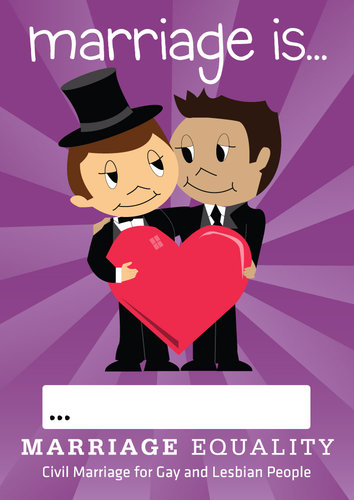The upcoming referendum on marriage equality has sparked some conversation among teachers who work in schools that are run by religious orders, particularly those in Catholic schools. The Catholic church, unsurprisingly, have outlined their stance in that they are opposing the question being put to the people of Ireland. Recent polls suggest that more than 80% of Irish people are in favour of marriage equality so where does this leave the people who are working in Catholic schools and what message, if any, should they give to pupils?
 Before I begin, I am not working in a Catholic school. I am also laying my cards out and proudly proclaiming that I am going to be voting in favour of marriage equality. When it comes to the issue potentially being discussed in school, it will be treated in the same manner as any other referendum topic. While I have my strong opinions on the matter, I don’t believe I should force them on pupils in my school, in much the same way I don’t force my personal beliefs on them either.
Before I begin, I am not working in a Catholic school. I am also laying my cards out and proudly proclaiming that I am going to be voting in favour of marriage equality. When it comes to the issue potentially being discussed in school, it will be treated in the same manner as any other referendum topic. While I have my strong opinions on the matter, I don’t believe I should force them on pupils in my school, in much the same way I don’t force my personal beliefs on them either.
However, if I were working in a Catholic school, I would be potentially worried. It is possible that members of the Board of Management could ask a principal to hand out literature or flyers to pupils asking them to support their view on the referendum. It is also possible that a Board of Management could ask a principal to take a public stance on the matter. While it is unlikely that a principal or a teacher would be forced to do something against their will, technically, a Board of Management can order staff to do anything and it has to be done, unless it’s illegal.
There are several examples of principals being forced to do menial jobs or even excessive work by a chairperson and, even upon union intervention, the practice could not be stopped. Effectively, in Ireland, a Board of Management can implement their wishes and the tasks have to be fulfilled. Boards of Management have a lot of power. Thankfully most of them use it sensibly and are very supportive of their schools.
However, there might be the exceptions – the schools that will ask teachers to hand out flyers or give opinions that aren’t in line with their own thinking and, perhaps, there will be nothing they can do about it. What is the difference in spreading a stance on marriage equality when, for 30 minutes a day, the teacher is spreading the word of the particular belief of the school anyway?
While I’m sure the majority of teachers are not against marriage equality, I think it’s potentially very dangerous for individual principals and teachers to fight against their management body by themselves. I believe that a public stance from teacher unions and representative bodies is acceptable, if only to protect the few teachers who might get affected by this. However, as I say, I’m not in a Catholic school and am not from a Catholic background but I think those who are have a right to be worried.


7 thoughts on “Denominational Schools and the Upcoming Marriage Referendum”
Denominational Schools and the Upcoming Marriage Referendum
http://t.co/uNvuSSKqd7 – http://t.co/jiQg67MkIk
http://t.co/1aanZaabGS
RT @IrishTeachers: Denominational Schools and the Upcoming Marriage Referendum
http://t.co/uNvuSSKqd7 – http://t.co/jiQg67MkIk
http://t.c…
Jonathan Kinsella liked this on Facebook.
Roy Mitchell liked this on Facebook.
RT @anseo: New Post: Denominational Schools and the Upcoming Marriage Referendum: #edchatie http://t.co/OZ0gAio0bJ
@anseo I also fear that some schools may be forced to engage in political activity by using kids to give out leaflets to support one side.
@anseo This really needs the unions to come on board and ask the churches not to use schools for political purposes in this referendum.
Comments are closed.